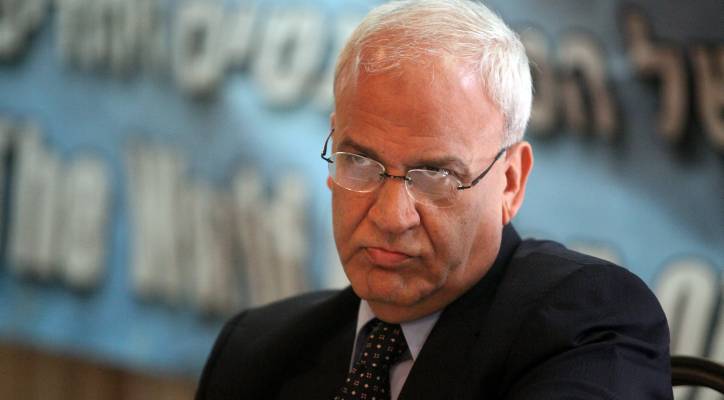Saeb Erekat again lied about non-existent Palestinian “history” and condemned the Balfour Declaration, which recognized Israel’s right to a Jewish national homeland in British-Mandate Palestine. He’s also pretty upset at the British for enabling it in the first place.
By: JNi.Media
PLO Secretary General Saeb Erekat is unhappy with many things, but this week he is especially unhappy with a British gentleman who’s been dead 85 years, named Arthur James Balfour, the First Earl of Balfour. The reason Erekat is so upset with the Earl this week is because 98 years ago, on November 2, 1917, he sent, in his capacity as Britain’s Foreign Secretary, a letter to another gentleman who is long gone, Walter Rothschild, the Second Baron Rothschild.
The letter was no small thing; it was an earth shattering event to millions of Jews. It shone through the dark skies of the Great War like a beacon, seen from the pale of settlements in faraway Russia to the cobblestone-paved streets of Manhattan. It stated, for all the world to read:
“His Majesty’s government view with favor the establishment in Palestine of a national home for the Jewish people, and will use their best endeavors to facilitate the achievement of this object, it being clearly understood that nothing shall be done which may prejudice the civil and religious rights of existing non-Jewish communities in Palestine, or the rights and political status enjoyed by Jews in any other country.”
Never mind that what Foreign Secretary really wanted was for the Jews of Wall Street (he really believed they controlled America’s economy, he was quite the anti-Semite) would be so happy with the promise, they would apply pressure on President Woodrow Wilson to enter the war in Europe on the British side. It was a British Hail Mary throw, because things were not well on the front. Europe was sliced up by a line of ditches that ran practically along its middle, and hundreds of thousands would die in an afternoon of fighting every now and then. America had to come in and decide the game in favor of the Anglo Saxon folks.
All this was good and well, argues Erekat, but then “ninety-eight years ago, the destiny of our nation changed due to the action of a foreign colonial power. The Balfour Declaration should serve as a reminder that what is happening in Palestine is a result of colonial decisions made in faraway capitals,” he said.
The problem with Erekat’s narrative is that the vast majority of credible historians, including Arab ones, don’t believe there was such a thing as a Palestinian nation back when Lord Balfour sat down to compose his declaration. According to legal historian Assaf Likhovski, the prevailing view is that Palestinian identity originated in the early decades of the 20th century. Historian Rashid Khalidi cautions against the efforts of Palestinian nationalists to “anachronistically” read back into history a nationalist consciousness that is in fact “relatively modern.” David Seddon writes that “the creation of Palestinian identity in its contemporary sense was formed essentially during the 1960s, with the creation of the Palestine Liberation Organization.”
Erekat turns a deaf ear to those eggheads, stating instead that “Mr. Balfour, on behalf of Great Britain, promised Palestine, a country over which Britain had no legal right, to another people.”
“The United Kingdom in particular should close the darkness of its colonialist past in the region by taking concrete steps in order to protect and promote Palestinian rights, including the recognition of the State of Palestine on the 1967 border with East Jerusalem as its capital,” Erekat said.
He ignores the fact that the United Kingdom, and much of the rest of the world, did just that, offered the Palestinians the majority of the territory between the Jordan River and the Mediterranean Sea, and as it happens, that too took place in November, of 1947, when the UN approved the partition plan. It was a two states for two peoples resolution, they could embrace it and live happily ever after, but they rejected it.
As the great Abba Eban put it so eloquently: “The Arabs never missed an opportunity to miss an opportunity.”
He, too, was a foreign minister.
